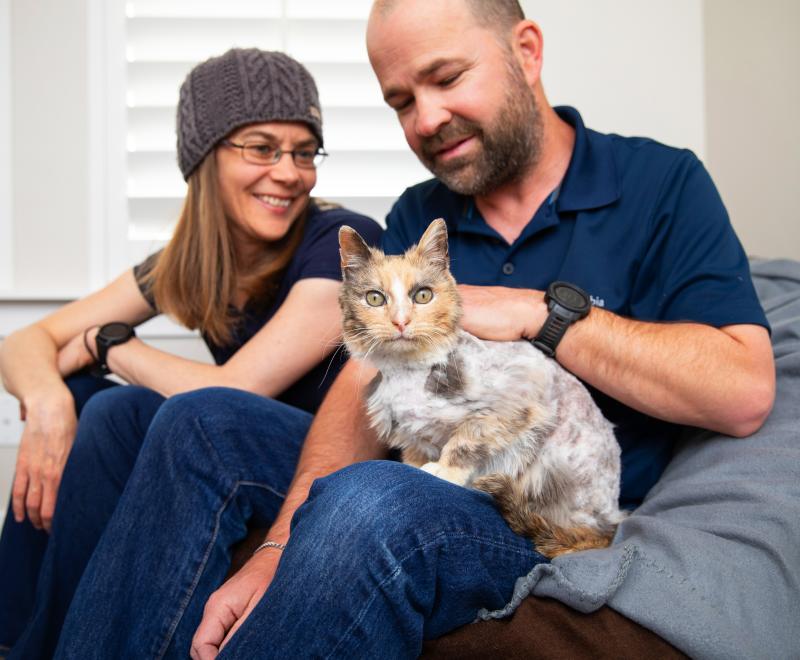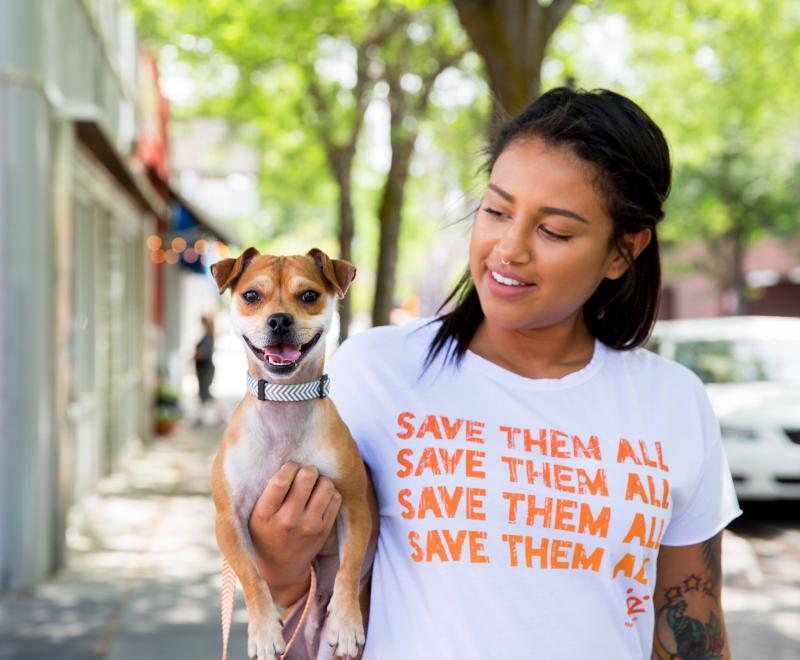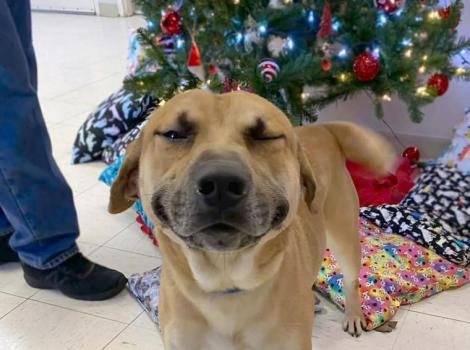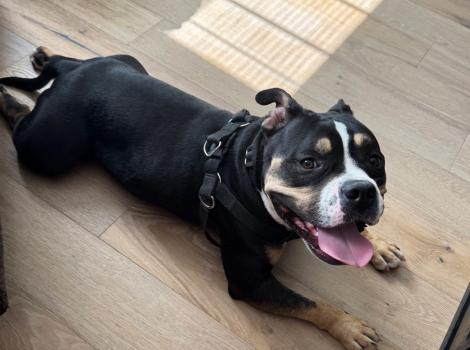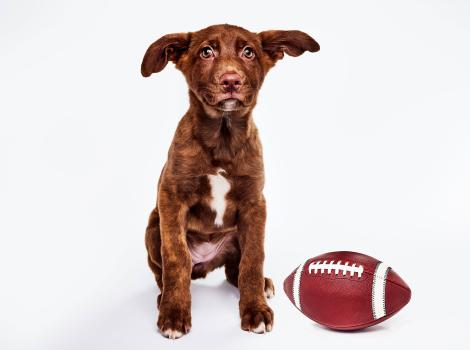How a Texas family became heroes for sick puppies

Twenty-two-year-old Skylar Clark hadn’t thought much about saving pets’ lives a few years back. Then, she offered to help someone who lived near their Marshall, Texas, home whose dogs had puppies. And when all 12 in Skylar’s care were diagnosed with parvovirus, she and her family decided to roll up their sleeves and do whatever they could to save them.
“I was just an uneducated teenager and didn’t know much about parvo or anything in animal welfare,” she says. “And when we learned that something like parvo can make it necessary to euthanize puppies, I was heartbroken and a little angry, too. That made our whole family more determined than ever to ensure that we got them through this.”
Parvo is a dangerous and contagious virus for which there’s no easy cure, only supportive care such as medication to fight nausea, fluids for dehydration, and antibiotics to prevent secondary infections. Puppies are more susceptible to the virus than adult dogs, and they are often the first to be stricken by it. Even with excellent supportive care, parvo can still be life-threatening.
Moved by the condition of the 12 puppies in their care, Skylar and her family connected with a local nonprofit, Friends of Marshall Animals (FOMA), a rescue organization and Best Friends Network Partner that provides support for the local shelter, Marshall Pet Adoption Center. The Clarks also worked closely with a local veterinary clinic. Armed with information, supplies, and training, they nursed their 12 puppies back to health and they all were eventually adopted.
Best Friends’ goal is for all shelters nationwide to reach no-kill in 2025, and people like the Clarks, who step up to foster pets for any animal shelter or rescue organization, play a vital part in reaching that goal.

Taking the parvo cause to heart and home
Ever since that first experience, the Clarks have made it their personal mission to do everything possible to treat dogs with parvo. Today, if puppies at the Marshall Pet Adoption Center come down with parvo, they are sent to the Clark residence for “personalized parvo care,” provided by Skylar, her siblings, and her parents.
“We have our own little quarantine room in our house where we can keep them as comfortable as possible,” Skylar says. “If they get to the point where we know they need more care for their symptoms than we can provide, we transport them out of town for overnight hospitalization. They usually only stay (in the veterinary hospital) a day, and then they’re back for the rest of the treatment.”
Skylar and her family have saved 140 puppies and dogs from parvo so far. Last year, the 116 pups they saved helped to lift the Marshall Pet Adoption Center’s dog save rate (the percentage of pets who enter the shelter and aren’t killed) to 94%, well over the no-kill benchmark of 90%.

Puppy parvo stories
Every single one of those puppies has a story, and Skylar told one of them at last summer’s Best Friends National Conference in Houston. Skylar was one of 32 attendees to enter a contest to share a story about the rewards of taking a risk and stepping outside one’s comfort zone to save animals. She shared a story about Legacy, an inspiring little pup with parvo who tried until the very end to survive.
The Clarks have honored Legacy by naming their family parvo rescue activity Legacy’s Legacy. “Legacy was a girl who wanted to fight for her life, and I wanted to fight with her,” she says. “Her memory made me brave enough to get up on stage for that speech.”
She had audience members in tears, and when they voted, Skylar was awarded the $1,000 prize to support her work.
Another memorable case was little Grunt. When a rescue group in Tyler, Texas, contacted Skylar about helping with four tiny puppies diagnosed with parvo, she said yes. “Sadly, three of them passed away,” she recalls. “Their bodies just weren’t strong enough to pull through. But the smallest of the four made it. Anytime you touched him, he would make these grunting noises like a little piggy. We called him Grunt.”
“I loved Grunt so much,” she says. “He was just 4 weeks old and weighed less than a pound when we got him. After getting over parvo, he got mites and lost his hair. He recovered and then got ringworm and lost his hair again. He was with us for eight months and was happily adopted by a family in Massachusetts.”
And then there’s Heath, the big, burly guy who was adopted by the Clarks after parvo treatment. Skylar says: “He’s a horse. He’s like … big. He has the face of a Lab, but his hair is long like a mutt. He’s so cute and sweet. Heath has become a permanent member of our family.”

A community effort to save sick puppies
Early on, the Clarks sought help from Taylor Veterinary Clinic in nearby Longview, Texas, to learn the basics of handling parvo cases. Now, if puppies need hospitalization, they often send them to the clinic. Justin Serna, a senior vet tech at Taylor who also volunteers at the Marshall shelter, has been a big help. “We wouldn’t be able to do any of what we do without the help we’ve received from Justin and everyone at Taylor Veterinary Clinic,” Skylar says.
Although Skylar is the lynchpin that makes things go at Legacy’s Legacy, making everything work together requires a family team effort that includes both parents, Summer and Steven; a sister, Halee; and brothers, Gavin and Jayson. Summer is also a member of the FOMA board of directors. “When it comes to actual treatment of parvo, it’s my family that makes it happen,” says Skylar. “But it also takes a lot of help from people at the shelter who let us know when an animal comes in with symptoms.”
“We also have a great relationship with our local vets,” says Skylar. “If they identify a pet whose family can’t afford treatment, they call us, and we can offer options. They also help us with health certificates for dogs who we transport for adoption once they have recovered.”

Looking to the future
Skylar says her family is looking ahead to helping save more dogs from parvo, an activity that in recent years has turned into major community service. “We can always use more funding, and we have only so much space in our home,” she says. “But we recently redid our parvo room and put in new stainless-steel kennels and other improvements.
“In the future, we would love to help other groups around the state with parvo, which is a continuing issue here in the South. I’ve spoken with some groups, and we may get a chance to go in and teach them how we handle parvo in our home.”
Michael Roach, Best Friends’ South Central region strategist who invited Skylar and her mother to tour the Best Friends Pet Resource Center in Bentonville, Arkansas, says he is talking with them about future mentoring of other shelters on parvo. “Rarely have I run across someone with as much determination and confident focus in our profession,” Michael says. “And to find that in a person Skylar’s age is exciting.”
[Quick response, teamwork save dogs in parvo outbreak]
Already off to a great start, Skylar sees a future for herself in animal welfare. In addition to her parvo work, she arranges transportation for pets from the Marshall Pet Adoption Center to other areas where they’re more likely to be adopted. Those trips are scheduled to increase from two to three per month this year. “We transported more than 600 animals for the center since June of last year,” she says.
In the meantime, Skylar is taking all kinds of college credit courses in animal welfare, shelter medicine, and related topics. “I really want to do something hands-on with shelter or rescue medicine,” she says.
Michael says the future of animal welfare in east Texas is bright with Skylar and her family out there saving lives. “She has a vision, and ‘no’ is simply not in her vocabulary,” he says. “If she represents the next generation of animal welfare, then I have tremendous hope for the future well-being of our pets.”

Let's make every shelter and every community no-kill in 2025
Our goal at Best Friends is to support all animal shelters in the U.S. in reaching no-kill in 2025. No-kill means saving every dog and cat in a shelter who can be saved, accounting for community safety and good quality of life for pets.
Shelter staff can’t do it alone. Saving animals in shelters is everyone’s responsibility, and it takes support and participation from the community. No-kill is possible when we work together thoughtfully, honestly, and collaboratively.


